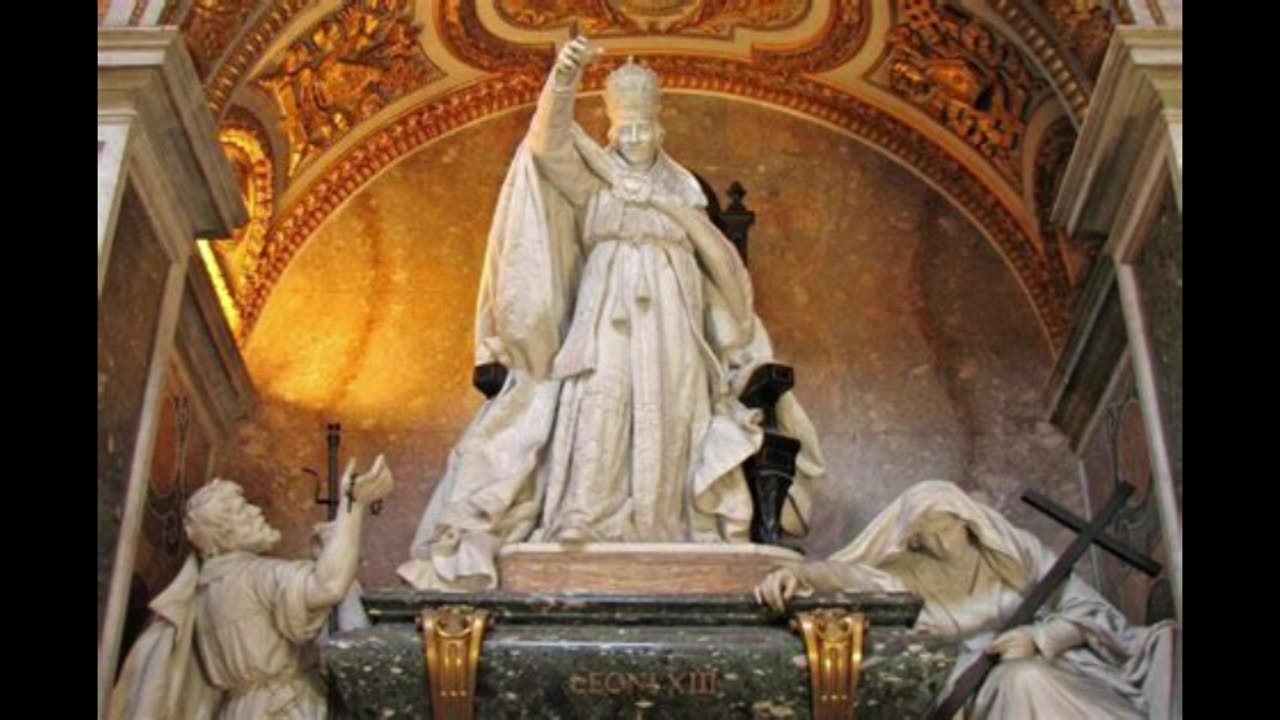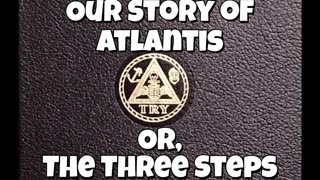Premium Only Content

Dall'alto dell'Apostolico Seggio (On Freemasonry in Italy) by Pope Leo XIII Part 3/3: Sections 39-58
In Part 3 of the audiobook Dall'alto dell'Apostolico Seggio (On Freemasonry in Italy), covering Sections 39-64, Pope Leo XIII concludes his encyclical with a comprehensive summary of his arguments against Freemasonry and its implications for the Church and society. This final section reinforces the themes explored in the previous parts while calling for a unified response from the faithful.
1. Masonic Ideology and Its Threats:
The Pope reiterates the core tenets of Masonic ideology, emphasizing how its principles contradict Christian doctrine. He argues that Freemasonry fosters a worldview that diminishes the role of God and undermines the moral foundation of society.
2. Spiritual and Moral Consequences:
Sections 39-64 highlight the spiritual and moral consequences of Masonic influence on individuals and communities. Leo XIII stresses that accepting Masonic ideologies can lead to spiritual decay, moral relativism, and a departure from the teachings of the Church.
3. Role of the Church as Guardian:
The Pope reaffirms the role of the Catholic Church as the guardian of truth and moral order. He emphasizes the Church's responsibility to educate the faithful about the dangers posed by Freemasonry and to provide guidance in resisting its influence.
4. Unity Among Catholics:
Leo XIII calls for unity among Catholics in the face of Masonic opposition. He encourages collaboration among clergy and laity to combat the spread of Masonic ideas and to promote a robust Catholic identity.
5. Practical Measures for Resistance:
In this section, the Pope outlines practical measures for resisting Masonic influence. He encourages the faithful to engage in prayer, charitable works, and community building as ways to strengthen their faith and counteract secularism.
6. Condemnation of Compromise:
Leo XIII warns against any form of compromise with Masonic organizations. He asserts that even small concessions to Masonic principles can lead to larger betrayals of faith and doctrine.
7. Final Exhortation:
The encyclical concludes with a strong exhortation for the faithful to remain steadfast in their beliefs. The Pope calls on Catholics to uphold the teachings of the Church, to be vigilant against the encroachment of Freemasonry, and to commit themselves to the defense of Christian values.
8. Prayer for Strength:
Leo XIII emphasizes the importance of prayer as a means of seeking divine assistance in the struggle against Freemasonry. He encourages the faithful to turn to God for strength and guidance as they confront the challenges posed by secret societies.
Part 3 serves as a powerful conclusion to the encyclical, encapsulating Pope Leo XIII's comprehensive critique of Freemasonry and its implications for the Church. His call for vigilance, unity, and active resistance remains a poignant reminder of the ongoing struggle to uphold Christian values in the face of secular ideologies.
About the Author:
Pope Leo XIII (1810-1903), born Vincenzo Gioacchino Raffaele Luigi Pecci on March 2, 1810, in Carpineto Romano, Italy, served as the 226th Pope of the Roman Catholic Church from 1878 until his death in 1903. His papacy is noted for its significant contributions to Catholic social teaching and its engagement with contemporary social and political issues.
Leo XIII was educated at the Roman Seminary and later at the Pontifical Gregorian University, where he developed a deep understanding of philosophy, theology, and law. He was ordained a priest in 1837 and embarked on a career that saw him rise through various ecclesiastical positions, including bishop of Perugia and cardinal.
Pope Leo XIII is best known for his social encyclicals, particularly Rerum Novarum (1891), which addressed the conditions of the working classes and set forth the Church’s stance on social justice, labor rights, and the role of the state in economic matters. This encyclical marked the beginning of modern Catholic social teaching.
His works include substantial theological writings and commentaries on Church doctrine. Humanum Genus (1884), his encyclical against Freemasonry, reflects his concerns about the moral and philosophical challenges posed by secret societies and their influence on society and the Church.
Leo XIII worked to restore the authority of the papacy and the influence of the Church in a rapidly changing world. His papacy was marked by efforts to address modernity, secularism, and the shifting political landscape of the late 19th century.
Leo XIII was known for his opposition to modernist trends within the Church, advocating instead for traditional doctrines and practices. His encyclicals often criticized secularism and liberalism, which he viewed as threats to Christian values.
Humanum Genus specifically addresses his concerns about Freemasonry and other secret societies, which he believed were undermining Christian values and Church authority. His criticism was rooted in a broader defense of Church doctrine against what he saw as subversive influences.
Pope Leo XIII’s papacy left a lasting impact on the Catholic Church’s approach to social issues and its engagement with modernity. His teachings continue to influence Catholic thought on social justice, the role of the Church in public life, and the Church’s relationship with secular ideologies. He died on July 20, 1903, and was succeeded by Pope Pius X.
-
 10:19:56
10:19:56
Deus Meum Que Jus
2 months agoOur Story of Atlantis, A Physician’s Adventure, ... (Full Title in Description)
775 -
 LIVE
LIVE
The Rabble Wrangler
1 day agoPUBG with The Best in the West!
29 watching -

EvilT4000
4 hours agoSaturday.....🟢For energy and focus click my Dubby link!
829 -
 LIVE
LIVE
SlingerGames
58 minutes agoSpartan Night - Halo and More | Creator for @SELFMADEGGS
30 watching -
 LIVE
LIVE
Mally_Mouse
6 hours agoSpicy Saturday!! - 10k CELEBRATION! - Let's Play: Labyrinthine
325 watching -
 37:09
37:09
The Mel K Show
7 hours agoMel K & Dr. Kirk Moore | A Doctor’s Oath: Doing What is Right No Matter the Cost | 7-26-25
22.7K9 -
 LIVE
LIVE
Cewpins
1 hour agoLet's BLAZE!!🔥SmokeSesh💨420🍃!MJ
54 watching -
 LIVE
LIVE
MDGgamin
10 hours ago🔴LIVE - TARKOV & ARMA - Shots For Subs Saturday!!! - Chilling & Chatting - #RumbleTakeover
20 watching -
 LIVE
LIVE
Eternal_Spartan
2 hours agoCollab w/ TheBeardedNerdd! | TARKOV AND MORE | Join the Best Chat on Rumble!!!!
32 watching -
 36:44
36:44
NordicVentures
5 days ago $2.19 earnedWINTER Bushcraft 2 Nights: Building ALONE a Survival Shelter
12K4